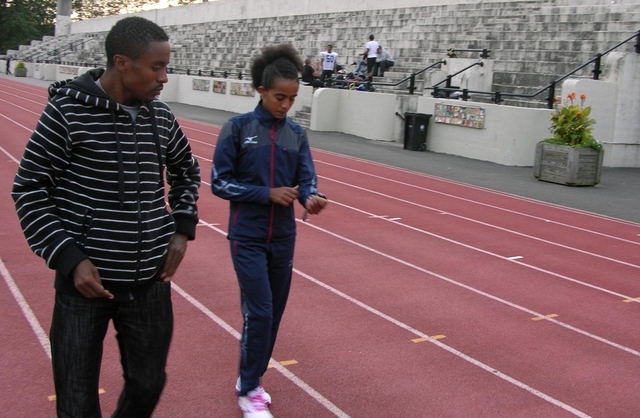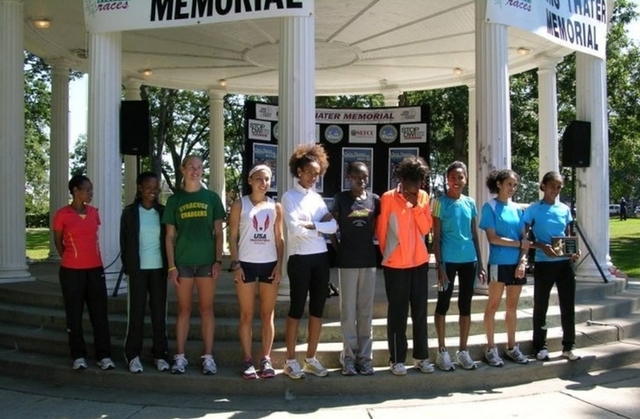Tadias Magazine
By Jason Jett
Updated: Thursday, October 27, 2011
New York (TADIAS) – Buzunesh Deba “is not in the local race, she is in the big race this time,” her husband-coach Worku Beyi emphasized last week in reference to the Ethiopian-born runner’s bid to become the first New Yorker to win the New York City Marathon since 1976 — before the race left Central Park to touch all five boroughs and become the world’s largest marathon.
On November 6 she will pursue the $130,000 overall top prize that goes to the first man and woman finishing the 26.2-mile race through Staten Island, Brooklyn, Queens, the Bronx and Manhattan.
Deba has the runner’s resume to be considered among the top five in the elite women’s field at the 2011 New York City Marathon.
Last June she won the Rock n’ Roll San Diego Marathon in 2:23:31, blazing the first half of the downward course in 1:09:53. Three months earlier she won the Honda Los Angeles Marathon. Last year she was victorious at the Twin Cities and Grandma’s marathons in Minnesota.
Deba was among the top-10 finishers both times she competed over the marathon distance in New York City, finishing 10th, in 2:29:55, last year and seventh two years ago in 2:35:54.
The New York City Marathon is a demanding 26 miles, 385 feet (42.195 kilometers), with five climbs onto bridges, that runners seeking fast times typically avoid in favor of running over relatively flat courses in Berlin or Chicago.
Beyi insists if the weather is pleasant, Deba has a good chance of beating the New York City Marathon course record of 2:22:31.
“In San Diego she ran the first 5K in 16:0-something,” he said. “Her 10k time was 32 minutes, she was on world-record pace. Then until 23 miles, she was on sub-2:20 pace.”
The husband-coach told Tadias that he first met Deba when she was age 13, and a year later attended one of her races, positioning himself along a clearing about 400 feet from the finish line.
“Buzunesh was second, a good distance behind the leader, when she came by,” said Beyi. “I shouted ‘go, go, go’ the next thing I knew she began to run faster. She passed the other girl and won the race.”
“When I congratulated her after the race I asked her how did she manage to pass the other girl so quickly?” he continued. “She said, ‘You gave me power. You are my power.'”
His wife’s pre-New York marathon workout routines peaked this fall to 130 miles a week, covered in two-a-day training sessions. Recently, Deba has slowed to about 90 miles a week with robust-morning and easy-evening sessions.
“Nutrition is very important for running a marathon,” Beyi said. “Marathon training is very hard, you have to eat properly. Up to one month before the marathon we ate a lot of meat and injera, but injera makes you heavy. Now we eat mostly vegetables, with a little chicken and some lamb soup.”
Deba gives a lot of credit for her success to Beyi — both his training and cooking.
Beyi, a world-class athlete, competes less now because of a medical condition and instead focuses on coaching Deba. Quite a cook also, friends say, Beyi said he prepares their meals so Deba can stay off her feet after training.
For Deba, the ascension was gradual. She arrived in New York on an athlete’s visa in 2007, and her early performance was hampered by chronic ankle problems.
With uneven success, she competed across the country at various races. It was not until September 2009 that Deba ran her first race over a 26.2-mile course — The Quad Cities (Iowa) Marathon — and won.
She found her winning stride, and with coaching from Beyi and altitude training in New Mexico, victories followed at the 2009 and 2010 California International Marathon as well as in Minnesota, Los Angeles and San Diego.

Buzunesh Deba trains under the watchful eye of husband-coach Worku Beyi as members of the Manhattan College Jaspers track and field team look on at Van Cortlandt Park in the Bronx on Monday, October 24, 2011. (Photo by Jason Jett for Tadias Magazine).

Buzunesh Deba, far right, holds trophy after winning the 2010 Chris Thater Memorial 5K in Binghamton, New York. (Photo by Jason Jett)
Now Deba is on the brink of a life-changing achievement. If she wins the New York City Marathon next week, it would mark the first time a female runner has left her homeland as an adult and rose to world-class status on the North American road-racing circuit. Only Khalid Khannouchi, who was born in Morocco and lived first in Brooklyn and then in Ossining, NY, has done that to date, winning the 1999 Chicago Marathon in a world-record time of 2:05:42 that since has been broken. Meb Keflezighi, winner of the 2009 New York City Marathon, was born in Eritrea but as a child moved with his family to the United States and grew up in San Diego.
In recent days, Deba has been besieged with media requests – which included interviews with The New York Times and The New York Daily News.
With a victory in New York, Deba would take a big step from her colleagues who survive by the same pattern she had followed in the U.S. until this year — racing here and there, virtually anywhere, to secure enough funds to support themselves and send home to family in Ethiopia.
More than dozen Ethiopian runners living in New York and Washington, D.C., are pursuing with season-highlight anticipation that New York City Marathon race-within-a-race from which Deba is attempting to move on. For them there is still gleam in the prospect of being the first city resident or New York Road Runners member to finish, and the money that comes with the distinction.
Pride unites the network of Ethiopian runners who live in and around New York, training in Van Cortlandt Park in the Bronx, Rockefeller State Park in Tarrytown and in Manhattan’s Central Park.
The pride is both for their homeland and in their resettlement in a country that offers greater opportunities — if they can find them amid all the competition from other Ethiopian nationals not to mention Kenyans, and East Europeans on the running circuit.
Friendships survive the race competitions, in which one runner’s success often means another’s failure in monetary terms ranging from several hundred to thousands of dollars.
Schadenfreude is a reality after each race, with everyone getting to share in it at some point as they hope for better for themselves in their next competition.
That is the manner in which relations within the network are affected by the hands of fate. One’s success is shared; one’s failure means there is opportunity for some other runner to move up.
The New York City Marathon brings local media attention to the running community each year. The scrutiny has not always been embraced by its members.
Nearly three years ago Village Voice reporter Graham Rayman extensively interviewed Ethiopian and Kenyan runners living in the Bronx for a post-New York City Marathon story. Rayman and photographer Jesse Reed spent days into weeks interviewing and photographing the runners in their homes as well as at training grounds in Van Cortlandt and Rockefeller State parks.
The result was a front-page story with a full-page picture of Ethiopian runner Abiyot Endale, who has photogenic looks to match his athletic prowess. However, photoshopped onto the bib of Endale’s running shirt was the headline: Will Run For Food.
The Ethiopian running community in New York was outraged.
Kassahun Kabiso, a Bronx runner who was featured in the report, said Rayman had befriended the runners and they had accepted him and his photographer into their homes and apartments. “He was our friend,” Kabiso said. “Maybe his editors changed the story.”
Rayman did not respond to a request for comment sent to his email account at the Village Voice.
The article, published December 17, 2008, is still viewable online along with additional comments but sans the cover photograph shown below.
The Ethiopian running community in New York is still stinging from the article, and wants the world to know that while their lifestyle is not luxurious neither is it impoverished.
“That was a bad article,” Beyi said, shaking his head, after leading Deba through a training session last week.
Endale and Derese Deniboba, who live at a Perry Avenue address in the Bronx that for the past six years has been home for Ethiopian runners, note that while they may live four people to an apartment the conditions are clean and well-maintained, if not spartan.
Deniboba recently recalled a conversation he had last summer with his absentee landlord.
“He called me over and said, ‘You know, you are not like the tenants I used to have. You guys are quiet, and never cause any trouble. Where are you from?'”
“I told him Ethiopia,” said Deniboba. “Then he asked, ‘What you do?'”
“I told him we are runners,” added Deniboba. “Then he said, ‘You guys are disciplined, you are in good shape. None of you are fat. I think I will take up running, too.'”
Will Run For Glory
Deba is running the New York City Marathon for the glory and the money.
Her six-figure annual earnings and a $40,000 Mizuno sponsorship, along with a 2011 Honda Insight hybrid car that was part of her prize for winning in Los Angeles, has her and Beyi preparing to buy a house in their adopted city — as she pursues United States citizenship.
Should Deba not win the New York race, but finish second, she would earn $65,000; plus bonus. A third-place finish would net her $40,000, fourth $25,000, fifth $15,000, and so on, plus bonuses.
November 6 likely will be a big payday for all the hard work and discipline Deba has put in every day the past few months, including rainy days on which Beyi suggested she rest but she insisted on going out and running in the rain for hours.
“I will do my best,” Deba said this week with a confident smile, which may have been a bit of humility coming from a runner who, when asked by a reporter after winning the 2009 California International Marathon at what point did she know she had won the race, replied: “At the start line.”
—
Related:
View more photos of Buzunesh Deba on our Facebook page
Buzunesh Deba: New York’s Hope at ING NYC Marathon

![RUNNER[2]](http://site-7328824.woop.host/wp-content/uploads/2011/10/RUNNER2-233x300.jpg)
Hi, I am the person on the cover of the Village Voice which they made a bad thing on my T-shirt. Thanks for this article. it’s great, great really, “YES WE ARE RUNNING FOR GLORY NOT FOR FOOD”!! Sport is for love of sport. It’s for everyone, it brings the world together in peace. That’s why we love New York City. We are Ethiopians, we love the world. Good luck for Buzunesh and Good luck for all ING NEW YORK MARATHON RUNERS ON 11/06/2011!!
All the best Buzu!!! Cheering you from far!!
I wish her all the best!
Uptown
As the person on the cover of village voice indicated, they should re-publish with the correct statement on the t-shirt, i.e. “Will run for Glory”. Good luck on 6 November to Abiyot, Bizunesh and Derese.
The Village Voice is not exactly “high-brow” reading. The Amaharic word is Mekenoch, Schadenfreude is the German version.
All the best to all the Ethiopian & Kenyan runners this wknd!!
Praying for your victory Buzunesh ! God is with you.